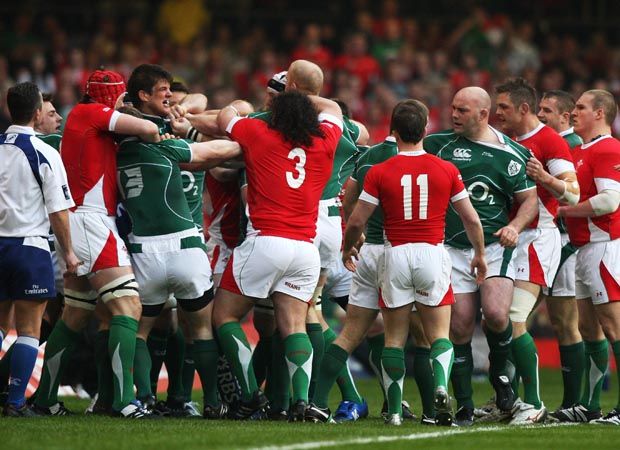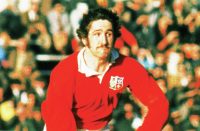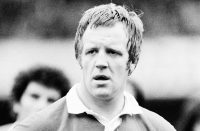
With both eyes firmly set on Round Two of the Six Nations and a challenging skirmish in Ireland, Gatland felt the need to explain himself for the umpteenth time when he could just have pointed to the winning outcome of the series.
Sometimes it is best to let sleeping dogs lie. Instead of declaring the case closed, his defence merely raised the tiresome question all over again: ‘So why did you drop Brian O’Driscoll?’
Even in the unlikely event of the Irish sporting public not having something better to think about, Gatland will hardly be quaking in his boots at some of ‘BOD’s’ brigade giving him a mild dose of the verbals. Put in the context of some real Irish-Welsh conflict it will all probably sound too tame for words.
Some of the best punches in the good old, bad old days, when permissive referees allowed successive generations of players to get away with blue murder, were thrown by heavyweight sluggers in red and green from opposite sides of the Irish Sea.
A quirk of history puts Gatland’s Dublin visit into perspective. Next Saturday’s set-to marks the centenary of an Ireland-Wales match of such recurring violence that some eye-witnesses described it as the dirtiest international they had seen.
It also happened to be the last one played on British soil before the start of The Great War.
According to some of the chief protagonists on the Irish side, Wales won the match because they won the fight. The tone for the scrap at the Balmoral Showgrounds in Belfast on March 11, 1914 had been set the night before when the Ireland captain, Dr William Tyrell, dropped in at the Welsh team’s hotel on the Friday night.
The precise reason for his visit has long been lost in the mists of time but there is little doubt that Tyrell had gone armed with a gauntlet which he threw at the feet of the hardest man among a pack of them, colliery foreman Percy Jones from Pontypridd.
“It’s you and me for it tomorrow,” Tyrell is said to have told Jones. Harry Uzzell, the Welsh hooker, was within earshot and, eager, no doubt, to establish whether this was a private matter or a free-for-all, is supposed to have asked his Irish opposite number: “Can anyone join in?”
From the off, the match descended into a series of running fist fights. The referee, Mr J Tulloch of Scotland, turned a blind eye which must have made it doubly difficult for the Wales captain, the Reverend Alban Davies.
As a man of the cloth, he presumably had to choose between the Old Testament edict about an eye-for-an-eye or the New Testament one about turning the other cheek. Maybe he, too, turned a blind eye instead.
His team sailed home with the Triple Crown and their forwards with a badge of honour, ‘The Terrible Eight’, bestowed upon them in grudging admiration by the Irish team they had outpunched and outpointed in equal measure.
It set a bruising bar for conflict between the so-called Celtic brothers, paving the way for the first double sending-off in the Five or Six Nations. The dismissal of the Wales lock Geoff Wheel and Ireland No. 8 Willie Duggan at Cardiff Arms Park on January 15, 1977 has remained one of rugby‘s murkier mysteries…until now.
Unlike Belfast more than half a century earlier, this time the Scottish referee actually imposed law and order. Norman ‘No-nonsense’ Sansom, unlike Mr Tulloch, made a tough stand in changing the old school philosophy of players taking the law into their own hands, not that the Establishment gave him much support.
Stewart McKinney, one of the invincible 1974 Lions and a hard man among hard men, remembers it well. “Moss Keane took the ball at the front of the lineout and I went in to drive the maul,” McKinney told me from his seaside home in Northern Ireland. “Wheel came right over the top and caught me flush on the jaw.
“It was a ferociously good punch and the first time I’d ever been knocked out on a rugby pitch. I was laid out for a count of about nine and when I came round ‘Gracer’ (Ireland captain Tom Grace) said: ‘You’ve got to stay on because Willie’s been sent off’.
“Sansom was a sending-off referee and he was never going to send Wheel off without an Irish player going too. Willie retaliated by hitting Allan Martin (the other Welsh second row) who wasn’t involved in the incident at all. We were a lot worse off for losing Willie than they were for losing Wheel.”
Duggan has always maintained that he wasn’t sent off, at least not in the strictest literal sense of the phrase as explained by the late Moss Keane. “Willie said to me that the referee came towards him and said would he mind leaving the field?,” Keane said. “And Duggan says: ‘Sure, not at all’. I was b******d anyway’.”
Again the Irish were counted out, just as they had been some eight years earlier when Wales captain Brian Price flattened Noel Murphy with a retaliatory uppercut in full view of the 20-year-old Prince of Wales. When I mentioned that match to HRH during a recent charity event at Llandovery RFC, his answer summed up the occasion: “There were a lot of fisticuffs that day…”
The fury then was nothing compared to Lansdowne Road on March 4, 1978, the day Wales completed their triple Triple Crown but not before JPR Williams had stopped Mike Gibson scoring by taking the Irish wing out after he had punted ahead for what would have been a certain try.
JPR, borrowing a line from the Andy Haden manual of how to play dirty and win rugby matches, admitted to committing a professional foul but that, like the All Black second row with his notorious dive from a lineout later that same year, he had to do something to save his team.
French referee Georges Domercq bottled it, JPR carried on amid a storm of booing and Wales won again. If it gets nasty again next Saturday and Gatland has to take some abuse, that will be a small price to pay for a huge step towards a third successive title.























